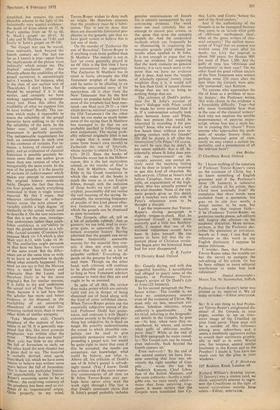Sir: Greatly daring, and with due respectful humility, I nevertheless
feel obliged to query some of the remarks in Professor Trevor- Roper's review of Dr Dodd's Life of Jesus (23 January).
In his second paragraph the Pro- fessor writes: 'The trouble is, we have no contemporary sources even of the existence of Christ. We must rely on late, uncertain evi- dence, fabulous relations, whose
authority is questionable . . In his third, referring to the biographi- cal details in the Gospels, he goes on—'At best, when were they re- membered, by whom, and across what gulfs of oblivious mytho- poeic time?' While at the end of his fifth paragraph he states round- ly—'No Gospel text can be traced, even indirectly, back beyond the fourth century AD.'
Even indirectly? 'By the end of the second century we have Iren- aeus asserting that four was ob- viously the right number of Gos- pels . . .' wrote the late Sir Frederick Kenyon, Chief Libra- rian of the British Museum; and the same authority—hardly a negli- gible one, we must surely admit— states that from surviving hag- ments it seems certain that the Gospels were translated into Cy-
riac, Latin, and Coptic 'before the end of the third century.'
And if the authenticity of the Gospels is to be impugned because they come to us 'across what gulfs of oblivious. mythopoeic time', what of the great writers of clas- sical antiquity? The earliest manu- script of Virgil that we possess was written some 350 years after his death; for Livy the interval is about 500',years; for Horace 900. for most of Plato 1,300. Are the gulfs of time less 'oblivious and mythopoeic' in their case? 'On the other hand the great vellum uncials of the New Testament were written perhaps some 250 years after the date when the Gospels were actu- ally composed', says Kenyon.
'To anyone who approaches the life of Jesus as a problem of secu- lar history', the Professor writes, 'this wide chasm in the evidence is a formidable difficulty.' True—hut why more formidable here than in the case of the classical writers? And why not mention the terrible impermanence of papyrus manu- script, whose loss was a main fac- tor in creating this 'chasm'? From anyone who approaches the prob- lems of secular history from a purely historical point of view, surely we may expect a certain im- partiality, and a presentation of all the relevant facts?


































 Previous page
Previous page